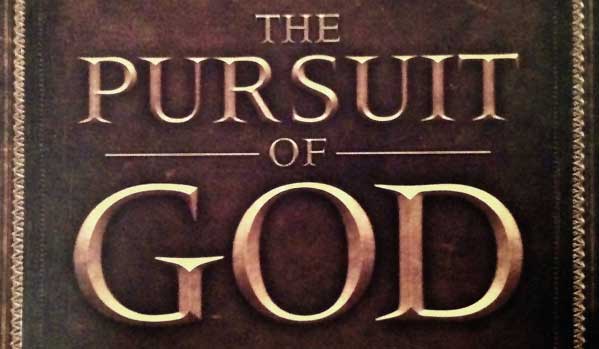Why We Need A.W. Tozer’s
“The Pursuit of God” More Than Ever Now

If you haven’t read A.W. Tozer’s The Pursuit of God, you might want to consider leaving wherever you are immediately — even if that requires pulling a fire alarm to cause a diversion so you can get out of the building — and rushing to your nearest bookstore to purchase it.
Strike that last part about the bookstore. I forgot that bookstores don’t exist anymore. My brain had slipped back into the 20th century for a moment.
So, uh, yeah, don’t pull any fire alarms or go searching the streets for phantom bookstores that don’t exist anymore. On your next bathroom break, just download the book on Kindle. Heck, I’ll even give you the link for it on Amazon.
The church desperately needs Tozer’s little book that he scribbled on a train ride across the country in 1948. It opens the door to what Christians need the most: intimate, fervent, determined, sustained one-on-one communion and fellowship with God Himself. Every believer needs this kind of closeness with God to navigate the turbulent, dark waters that the world spews at us.
Please don’t mistake this to be some kind of self-help infomercial advertising a magic elixir that will make you a more successful, wealthy, physically fit, shinier, happier person in all of your earthly circumstances. The crux of Christianity, it seems to me, is less concerned about earthly, material pursuits than it is about eternal ones (though God, in His tender mercies, does care deeply about our earthly circumstances as well and is with us through all of them).
Our relationship with eternity, therefore, and our relation to the One who abides in and defines eternity, is the true prize as we roam this temporal earth as strangers and pilgrims.
I will go so far as to say that our heart’s peace and contentment is directly proportional to its intimacy with the Personality whose image we bear. And, to conclude this article, I will let Tozer himself explain what I mean. Here is an excerpt from the opening paragraphs of The Pursuit of God:
“God is a Person, and in the deep of His mighty nature He thinks, wills, enjoys, feels, loves, desires and suffers as any other person may. In making Himself known to us He stays by the familiar pattern of personality. He communicates with us through the avenues of our minds, our wills and our emotions. The continuous and unembarrassed interchange of love and thought between God and the soul of the redeemer man is the throbbing heart of New Testament religion.
“This intercourse between God and the soul is known to us in conscious personal awareness. It is personal: that is, it does not come through the body of believers, as such, but is known to the individual, and, to the body through the individuals which compose it. And it is conscious: that is, it does not stay below the threshold of consciousness and work there unknown to the soul (as, for instance, infant baptism is though by some to do), but comes within the field of awareness where the man can ‘know’ it as he knows any other fact of experience.
“You and I are in little (our sins excepted) what, God is in large. Being made in His image we have: I within us the capacity to know Him. In our sins we lack only the power. The moment the Spirit has quickened us to life in regeneration our whole being senses its kinship to God and leaps up in joyous recognition That is the heavenly birth without which we cannon: see the Kingdom of God. It is, however, not an end but an inception, for now begins the glorious pursuit the heart’s happy exploration of the infinite riches of the Godhead. That is where we begin, I say, but where: we stop no man has yet discovered, for there is in the awful and mysterious deaths of the Triune God neither limit nor end.
‘Shoreless Ocean, who can sound Thee?
Thine own eternity is round Thee,
Majesty divine!“To have found God and still to pursue Him is the soul’s paradox of love, scorned indeed by the too-easily-satisfied religionist, but justified in happy experience by the children of the burning heart. St. Bernard stated this holy paradox in a musical quatrain that will be instantly understood by every worshipping soul:
‘We taste Thee? O Thou Living Bread,
And long teast upon TThee still:
We drink of Thee, the Fountainhead
And thirst our souls from Thee to fill.“Come near to the holy men and women of the past and you will soon feel the heat of their desire after God. They mourned for Him, they prayed and wrestled and sought for Him day and night, in season and out, and when they had found Him the finding was all the sweeter for the long seeking. Moses used the fact that he knew God as an argument for knowing Him better. “Now, therefore, I pray thee, if I have found grace in thy sight, show me now thy way, that I may know thee, that I may find grace in thy sight”; and from there he rose to make the daring request, “I beseech thee, show me thy glory.” God was frankly pleased by this display of ardor, and the next day called Moses into the mount, and there in solemn procession made all His glory pass before him” (Tozer, A.W The Pursuit of God. Harrisburg, PA: Christian Publications, 1948, 1, 2.).


